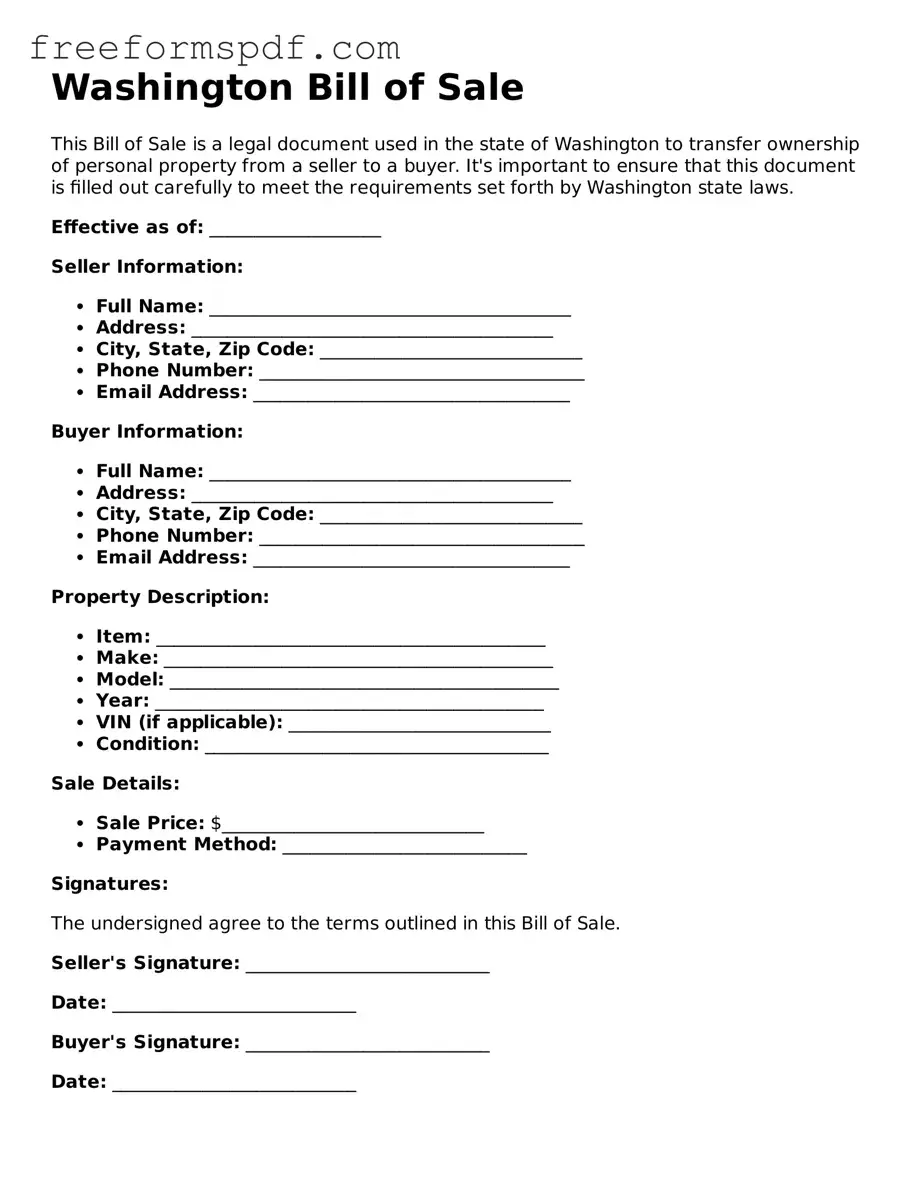Attorney-Verified Bill of Sale Document for Washington State
Common mistakes
-
Not including all required information. Make sure to fill in the names, addresses, and contact information for both the buyer and seller.
-
Failing to provide a complete description of the item being sold. Include details like make, model, year, and VIN for vehicles.
-
Omitting the sale price. Clearly state the amount agreed upon for the transaction.
-
Not signing the form. Both parties must sign the Bill of Sale for it to be valid.
-
Using incorrect dates. Ensure that the date of the transaction is accurate and formatted correctly.
-
Forgetting to check local regulations. Some areas may have specific requirements for Bill of Sale forms.
-
Neglecting to make copies. Always keep a copy for your records after the form is completed.
-
Not having witnesses if required. Some transactions may need a witness to validate the agreement.
-
Assuming a generic form is sufficient. Customizing the Bill of Sale to fit your specific transaction is often necessary.
Learn More on This Form
-
What is a Washington Bill of Sale?
A Washington Bill of Sale is a legal document that records the transfer of ownership of personal property from one party to another. It serves as proof of the transaction and can be used for various types of property, including vehicles, boats, and personal items. This document is particularly important in Washington State as it helps to protect both the buyer and the seller by providing a clear record of the agreement.
-
What information is required on a Washington Bill of Sale?
The Bill of Sale must include specific details to be valid. Essential information includes:
- The names and addresses of both the buyer and the seller
- A description of the item being sold, including make, model, year, and VIN (for vehicles)
- The sale price
- The date of the transaction
- Signatures of both parties
Providing complete and accurate information helps prevent disputes in the future.
-
Do I need to have the Bill of Sale notarized?
In Washington State, notarization is not typically required for a Bill of Sale. However, having the document notarized can add an extra layer of authenticity and may be beneficial in certain situations, such as when registering a vehicle. Always check with local regulations or specific requirements of the transaction to ensure compliance.
-
Is a Bill of Sale required for all transactions?
While a Bill of Sale is not legally required for every transaction, it is highly recommended for significant purchases or sales, especially for vehicles and boats. This document provides legal protection and can be useful for tax purposes or in case of disputes. For smaller, everyday transactions, a Bill of Sale may not be necessary, but it can still be a good practice to create one.
-
Where can I obtain a Washington Bill of Sale form?
Washington Bill of Sale forms can be obtained from various sources. Many online legal services offer free or paid templates that can be customized. Additionally, local government offices, such as the Department of Licensing, may provide official forms. Ensure that the form you choose meets the specific requirements for your type of transaction.
Misconceptions
When it comes to the Washington Bill of Sale form, there are several misconceptions that can lead to confusion. Understanding these can help individuals navigate the process more effectively. Here are five common misconceptions:
- It is only needed for vehicle sales. Many people believe that a Bill of Sale is only necessary for the sale of vehicles. In reality, this document can be used for various transactions, including the sale of personal property, boats, and even livestock.
- A Bill of Sale is not legally binding. Some think that a Bill of Sale does not hold any legal weight. However, when properly completed and signed, it serves as a legal record of the transaction and can be used in court if disputes arise.
- It does not need to be notarized. There is a common belief that notarization is unnecessary for a Bill of Sale. While it is not always required, having the document notarized can add an extra layer of authenticity and protection for both parties.
- All Bills of Sale are the same. Many assume that a Bill of Sale is a one-size-fits-all document. In truth, the specific requirements can vary based on the type of sale and local regulations, making it important to use the correct form for your transaction.
- Only the seller needs to sign it. Some people think that only the seller's signature is required on a Bill of Sale. In fact, both the buyer and seller should sign the document to ensure that both parties agree to the terms of the sale.
Being aware of these misconceptions can help individuals make informed decisions when engaging in sales transactions in Washington. A well-prepared Bill of Sale can protect both buyers and sellers, ensuring a smooth process.
Some Other Bill of Sale State Templates
Does a Bill of Sale Have to Be Notarized in Virginia - A Bill of Sale often requires signatures from both the buyer and seller, formalizing the agreement.
Nys Dmv Bill of Sale - This document can be used as evidence in court if a dispute arises.
The California Employment Verification form is a document used to confirm an employee’s job status and details with their current or past employer. This form is an essential tool for various purposes, including loan applications, background checks, and other employment-related processes. To learn more about the form and access the necessary resources, please visit PDF Documents Hub.
Vehicle Bill of Sale Template - It's advisable to keep copies for both the buyer and seller.
